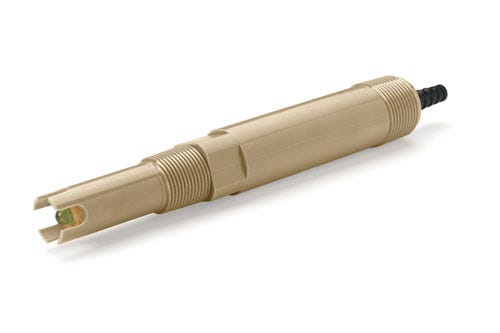PEEK housings protect sensors in harsh environments
High-performance industrial sensors from Advanced Sensor Technologies Inc. (ASTI; Orange, CA), which are now supplied in housings injection molded of unreinforced polyetheretherketone (PEEK) from Solvay Advanced Polymers, not only are working in high-temperature, harsh-chemical environments, but are long-lived and low-maintenance, according to ASTI.
November 9, 2009
High-performance industrial sensors from Advanced Sensor Technologies Inc. (ASTI; Orange, CA), which are now supplied in housings injection molded of unreinforced polyetheretherketone (PEEK) from Solvay Advanced Polymers, not only are working in high-temperature, harsh-chemical environments, but are long-lived and low-maintenance, according to ASTI. The sensors measure pH, oxidation-reduction potential (ORP), and ion concentration and are designed to endure temperatures to 135°C (275°F), while resisting attack from a variety of chemicals, according to Martin Patko, president of ASTI. Solvay's KetaSpire PEEK offers a heat deflection temperature of 315°C (599°F) and continuous-use temperature up to 240°C (464°F).
The sensors measure pH, oxidation-reduction potential (ORP), and ion concentration and are designed to endure temperatures to 135°C (275°F), while resisting attack from a variety of chemicals, according to Martin Patko, president of ASTI. Solvay's KetaSpire PEEK offers a heat deflection temperature of 315°C (599°F) and continuous-use temperature up to 240°C (464°F).
Solvay says the material is outstanding in resisting organics, such as solvents, as well as acids and bases, and also provides excellent mechanical performance, especially in the high-pressure environments where ASTI's sensors are installed. Patko adds that these PEEK grades require 40% of the annealing time needed by other commercially available grades, thereby providing increased productivity.
KetaSpire PEEK also handles a range of secondary operations, including machining, while yielding an improved surface finish and reducing tooling abrasion. The material is processed in standard injection molding systems and can also be extruded and compression-molded. ASTI's sensors are used for process control measurement and monitoring in applications such as chemical manufacturing, mining, pulp and paper, water treatment, waste water, and food and dairy production. —[email protected]
About the Author(s)
You May Also Like


